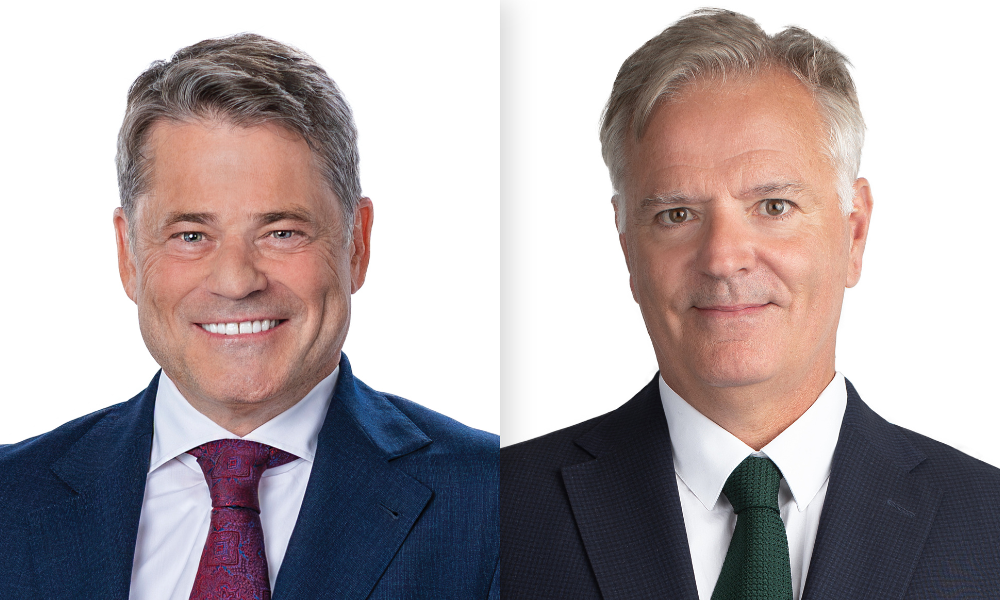Canaccord Genuity CEO & Head of Private Client Group explain why advisory teams can win as clients trim their service providers

The average high net worth (HNW) and ultra high net worth (UHNW) client is trimming their total number of financial service providers. Where they had previously worked with an average of three advisors, there is a strong desire to trim that down to a single source of advice. At the same time, those families are beginning the great wealth transfer. As HNW and UHNW baby boomers pass their wealth on to their heirs, the advisors who can best serve and facilitate that transfer often become the advisors their families choose to stay with. Canaccord Genuity (CG) is well aware of these trends, and their leadership believes that one way advisors can win out and become the primary source of advice for HNW and UHNW clients in this wealth transfer is by becoming full service advisory teams.
Stuart Raftus, CEO of Canaccord Genuity Corp. and Matt Cicci, Head of the Private Client Group at CG Wealth Management, sat down with WP to explain why clients are trimming their service providers, why teams can offer an advantage, and what they’re doing at CG to equip their advisors for success. They acknowledged that a team approach is not always the best for every advisor. However, they note that as advisors work to manage the complex needs of their HNW and UHNW clients, a full-service advisory team offers some significant advantages.
“A team is absolutely critical if you want to be the advisor of record and handle all the different dimensions of a family’s transfer of wealth,” Raftus says. “Sometimes its just a question of different personalities relating with different people. The complexity changes from maybe just dealing with the patriarch and matriarch of a family, to talking with four, five, or eight family members, plus spouses and grandchildren. You need a team in the truest sense of the word, to bring different relationships and different expertise. You need experts in financial planning, in investments, and in relationships.”
Cicci added to Raftus’ point that, as important as teams are, the traditional concept of a Canadian advisory team is not quite suited to the needs of today’s wealth transfer. The modern concept of an advisory team that Raftus and Cicci are working to build at CG has a broader scope of practice. They can cover the needs of different age groups and offer continuity in the breadth of planning services and taxes.
“To be that one trusted advisor, you have to have that practice and team where there’s continuity, where there’s redundancy, where there’s a wide breadth of expertise and often, where there is more than one leader,” Cicci says.
The two major trends of trimming service providers and the intergenerational transfer are closely connected. During the accumulation stages of their lives, Raftus explains that many wealthy individuals will accumulate advisors along with assets. Their assets will typically be divided between three advisors, one advisor will hold the majority of assets at around 60-70 per cent, a second advisor may hold around 20-30 per cent, with a final advisor holding around 5-10 per cent of assets.
When clients decide to trim their number of service providers as they prepare to decumulate and pass on assets, it may seem obvious for them to simply go with the biggest provider. Raftus and Cicci explain that while it may seem like clients will go with the advisor who hold the majority of their assets, the advisor who tends to win is actually the advisor who is the architect of the financial plan.
“That’s the person who ended up with the deepest relationship with the client, who has shown the greatest breadth and depth of expertise in helping the family find comfort,” Raftus says.
Somewhat counterintuitively, the rate of return an advisor can deliver is often only ranked fourth or fifth in importance across many client surveys. Financial planning and its connected virtues of trust and accessibility are among the services that clients value most.
“There’s been a huge trend towards the democratization of financial knowledge,” Cicci says. “There are so many ways that clients are informed. They’re smart, and they realize the importance of looking at the whole board and delivering great family financial advice.”
Cicci explains that teams can create a sense of trust and continuity for those clients. By constructing a team that feels like it can last beyond the career of a single advisor, or even a single cohort of advisors, clients will feel more ready to trust that team in guiding the next generation of their family.
CG is now working to build modern teams that can earn client trust and offer that continuity. Cicci says they’re doing so by building out the infrastructure and technology that their advisors need to serve complex clients. That includes investments in their CRM, financial planning tech, and digital engagement platforms. That also includes investment options that can serve ESG requirements and other investment needs. These investments, Cicci explains, are the product of years of work on the part of CG as they work to equip their advisors and their advisory teams with the means to win in this wealth transfer.
“Clients are more willing now to pay for high quality advice than ever before, because they understand that not getting good advice eds up far more expensive,” Cicci says, “We now see more potential to grow huge practices than there has ever been. But you’re only going to grow that practice if you build a team, get sophisticated, advertise, and offer a wide breadth of service offerings with different touchpoints for different generations.”



